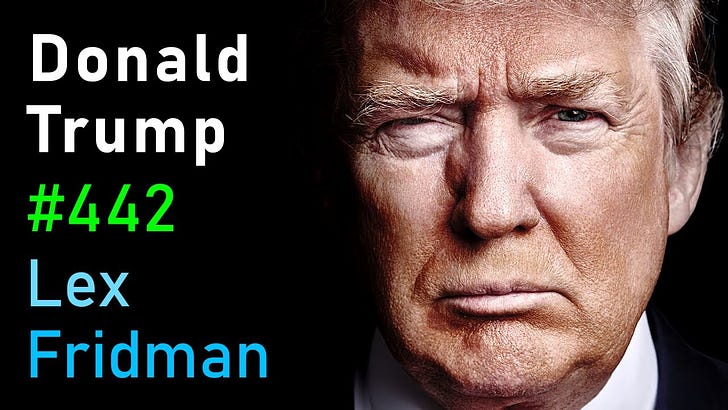Cherish the Republic, Not Donald Trump
A true leader invests in personal development time to transform themselves; a poor leader wings it.
If you pray, pray for the American Republic.
The moderators of ABC presidential debate demonstrated extreme bias—but surely no one expected otherwise. Trump was undisciplined, ill-prepared, and susceptible to being rattled. Kamala Harris's shallowness and extreme policies would have been quickly exposed by a well-trained high school debater.
You probably know the tale of the frog and the scorpion. A scorpion enlists a frog's help to cross a river. The frog refuses because of fear of being stung. The scorpion says that if he stings the frog, they will both perish in the water. The frog agrees to transport the scorpion, the scorpion stings, and they both meet their demise in the water. The reason scorpions sting is because they can’t rise above their nature.
People can choose otherwise, but the ABC journalists and Trump willingly embraced their worst instincts, refusing to rise above their nature.
A sports figure who spends the night before a big game carousing betrays the trust of those spending good money to see him perform. Likewise, Trump betrayed the trust of his supporters by his unwillingness to be coached up.
A true leader invests in personal development time to transform themselves; a poor leader wings it. A leader who depends on a cult of personality for support can have no lasting success.
Of course, that Trump performed poorly doesn’t mean Harris did well. Her lies and non-answers were carefully scripted. Michael Rectenwald’s observations crystalize the crucial issues:
Under favorable and biased conditions, Harris managed to smile and smirk—to an audience faced with alarming and exploitative price inflation, needless and expensive wars, record mass illegal immigration, record fentanyl overdoses, escalating chronic disease, collusion between Big Tech and the federal government, the government’s obeisance to Big Pharma, mandatory vaccinations and their imposed damage to health—to an exhausted American electorate that has lost faith in the political and economic establishment and suffered under its war against the people.
Yet, what did Trump expect? If Trump didn't recognize his need to get ready for a debate by learning how to control himself, how can we expect him to tackle the great American crisis that Rectenwald describes?
During repeated questioning about his healthcare plans, Trump couldn’t be bothered to mention the “make America healthy again” initiatives he and Bobby Kennedy have talked about. If Trump is elected, no one should be surprised if he “fires” Kennedy and goes back to bragging about the next vaccine he rushes to market.
Trump kept warning of a doomed America under a Marxist president Harris. I share his foreboding. But after his pathetic debate performance, I have little confidence in his promise to get the budget under control, to name just one issue. As I have previously written, I do believe he is significantly less likely to lead us into a war with Russia, which is no small matter.
Perhaps the American Republic can endure a Kamala Harris presidency, but it cannot withstand a Harris presidency alongside a Democratic Congress. If Trump's self-destruction continues, the American Republic will suffer the consequences.
America has handled one-party rule several times without significant repercussions. Nevertheless, the situation has shifted. Democrats promise permanent governmental changes, including ending the Senate filibuster and adding Puerto Rico and the District of Columbia as states. They also plan to expand the Supreme Court to prevent new radical laws from being declared unconstitutional.
These foundational changes obliterate checks and balances, the core design feature built into the Constitution to prevent abuses of power. Losing these would cause America to lose her tried-and-true form of government. What can be so quickly destroyed will take a very long time to rebuild, perhaps generations.
James Madison explained why checks and balances “should be necessary to control the abuses of government” in Federalist Paper No. 51. No matter what you believe about the goodness of Kamala Harris and the Democrats, their character is not enough to prevent abuses to liberty:
If men were angels, no government would be necessary. If angels were to govern men, neither external nor internal controls on government would be necessary. In framing a government which is to be administered by men over men, the great difficulty lies in this: you must first enable the government to control the governed; and in the next place oblige it to control itself.
Experience has taught mankind the necessity of auxiliary precautions.
Madison explored how “opposite and rival interests” compensate for a “defect of better motives,” so that the “private interest of every individual may be a sentinel over the public rights.” Madison continued:
In republican government, the legislative authority necessarily predominates. The remedy for this inconveniency is to divide the legislature into different branches; and to render them, by different modes of election and different principles of action, as little connected with each other as the nature of their common functions and their common dependence on the society will admit.
“Different modes of election” refers to the original Constitution. In the original Constitution, state legislatures appointed the U. S. Senators to represent their state. Direct election of senators began in 1914, after the ratification of the 17th Amendment. Ben Sasse, a former Republican senator from Nebraska, has called for the repeal of the 17th Amendment, explaining how appointment by states would introduce different perspectives and provide a check against polarization:
Different states bring different solutions to the table, and that ought to be reflected in the Senate’s national debate. The old saying used to be that all politics is local, but today—thanks to the internet, 24/7 cable news and a cottage industry dedicated to political addiction—politics is polarized and national. That would change if state legislatures had direct control over who serves in the Senate.
The framers of the Constitution understood that democracy does not guarantee liberty and justice for all. The rights of the minority can be usurped under democratic rule. Madison explained:
It is of great importance in a republic not only to guard the society against the oppression of its rulers, but to guard one part of the society against the injustice of the other part. Different interests necessarily exist in different classes of citizens. If a majority be united by a common interest, the rights of the minority will be insecure.
As 2020 Democratic presidential candidate Andrew Yang observed, “the Democratic party, unfortunately has taken on this role of the coastal urban elites who are more concerned about policing various cultural issues than improving their way of life that has been declining for years.”
The coastal elite mindset has unleashed destructive forces that are inimical to the rights the Constitution is designed to protect. Gary Saul Morson, an acclaimed professor of Russian literature at Northwestern University, sees parallels between revolutionary Russia and contemporary America. Speaking of the violence unleashed in cities across the U.S. in the summer of 2020, he was alarmed at the number of well-meaning people who can’t bring themselves to condemn violence in pursuit of political or social goals:
When you’re dragged along into something you don’t really believe yourself—because otherwise you are identified with those evil people, and your primary identity is being a ‘good guy,’ not like those people—you will wind up supporting things you know to be wrong. And unless there is some moral force that will stop it, the slide will accelerate.
The observations of Morson and Yang provide a backdrop to examine what can happen if the Democrats sweep this fall. A mandate would be claimed, executive orders will be signed in record numbers and calls to reform the Supreme Court if it gets in the way will accelerate.
Under the Constitution, no president has the power to mandate anything. In James Madison’s words, the federal government is limited to “few and defined” powers.
The framers of the Constitution wrestled with a problem of democracy: In Madison’s words, imposing measures decided “not according to the rules of justice and the rights of the minor party, but by the superior force of an interested and overbearing majority.”
In today’s highly polarized political environment, without checks and balances, it is a near certainty that terrible outcomes will instead be driven by the inordinate power of “coastal urban elites.”
The Founding Fathers knew that to preserve liberty, we must not trust politicians with concentrated power. If we end up with one-party rule, the American people will receive a crash course in the wisdom of the Founders.
Upgrade to a paid subscription today and receive immediate access to the archives of Mindset Shifts U. In just a few weeks, to help preserve the Republic, we will begin our study of The Road to Serfdom.







As a former native Californian, I can attest to the chaos brought to average everyday Americans, thanks to the Democratic One-Party Rule. The Coastal Elites justified the destruction as a more “Inclusive Society,” which will serve as a model nationwide.
I abandoned my native state in 2015 to save my family from the resulting crime and impossible prices of gasoline, et al.
You are correct Professor Brownstein.
One-Party Rule will be the order of the day unless ordinary Americans embrace the moral wisdom of our Founders, rather than parade around the latest Tik-Tok meme.
Donald Trump is only a man who at times can’t seem to get out of his own way. But the aspirations and themes of the message are critical to the survival of this nation for ordinary Americans, not just the Coastal “Elite Justice Crowd.
Outstanding essay - thank you Barry - many people need to read this!